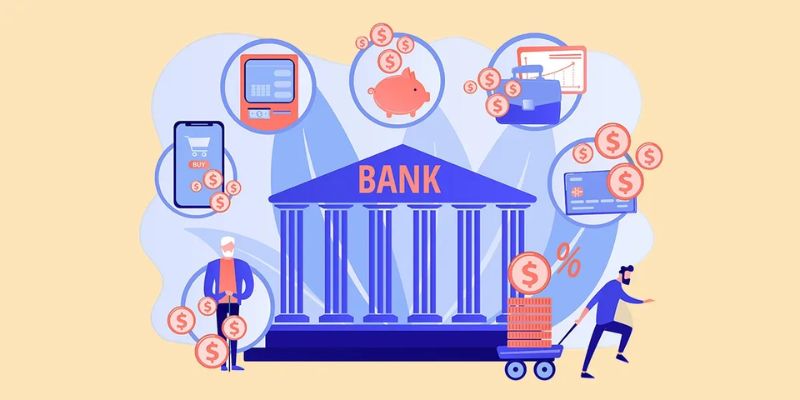Do Small Commercial Banks Offer Higher Interest Rates Than Commercial Banks?
Susan Kelly
Dec 12, 2023
Do you have a savings account at a small commercial bank? Can you get a higher interest rate? Have you considered switching to a commercial bank but want to ensure it’s better for your finances? We will examine which types of banks offer higher interest rates and how those rates compare.
We'll also chew over other factors, such as security, fees, and services, that might influence your decision. Read on to discover whether or not smaller commercial banks provide higher interest rates than larger commercial banks.
What Is a Commercial Bank?

A commercial bank is a financial institution that offers banking services to businesses and individuals. These services include checking and savings accounts, loans, mortgages, credit cards, and other investments. Commercial banks are for-profit entities aiming to generate profits by providing banking services to customers in exchange for fees.
How Commercial Banks Work

Commercial banks function by accepting customer deposits and using those funds to lend money. Banks collect interest on their loans while paying interest to customers who deposit their money. Most commercial banks are FDIC-insured, meaning your deposits are protected up to certain limits if the bank fails. Finally, many commercial banks offer online banking, ATM access, and financial advice.
What Is a Small Commercial Bank?
A small commercial bank is a financial institution that is much smaller than the major national banks. These banks are typically regionally focused and provide some of the same services as larger banks but typically offer higher interest rates on your deposits.
Are there any differences in interest rates between small and large commercial banks?
Small commercial banks generally provide higher interest rates than larger commercial banks. This small commercial banks is because smaller banks tend to have fewer overhead costs associated with running the business, allowing them to pass those savings on to their customers through higher interest rates.
Additionally, small commercial banks often focus on offering specialized services tailored specifically to their clientele, making them more attractive to customers looking for higher interest rates.
However, it is important to consider other factors when choosing a bank, as the interest rate alone may not be enough to make a bank the best choice. Security measures, fees, customer service, and additional services should also be considered when selecting a bank. You must decide which factors are most important to you to determine which type of bank best meets your needs.
How the Banking Sector Makes a Profit
The banking industry makes a profit by collecting interest and fees on loans, investments, and other services it provides. Banks can offer higher interest rates to customers because they can charge additional fees or increase the rates for certain services.
Banks make money from investment portfolios and other financial activities such as trading stocks and bonds. Ultimately, the bank aims to generate enough revenue from its operations to offer competitive interest rates while making a profit.
Small commercial banks recommend higher interest rates than large ones because they have lower overhead costs and can afford to pass the savings on to their customers through higher interest rates.
However, when choosing a bank, it is important to consider other factors, such as security measures, fees, customer service, and additional services. Ultimately, the best choice for an individual will depend on their needs and priorities.
Example of Interest Rate Impact on Commercial Bank's Earnings
For example, if a commercial bank offers a savings account with an interest rate of 0.5%, the bank would earn $500 in interest for every $100,000 deposited. If the same bank increased its interest rate to 1%, it would earn $1,000 for every $100,000 deposited. This increase in revenue from higher interest rates could help the bank maintain profitability and provide financial services to customers at competitive prices.
Small commercial banks generally recommend higher interest rates than large banks due to their lower overhead costs. However, other factors such as security measures, fees, customer service, and additional services should be considered when choosing a bank.
Are Higher Interest Rates Good for Stocks?
Higher interest rates can have both positive and negative impacts on stocks. Generally, higher interest rates are good for stocks because they signal that the economy is growing, which typically leads to increased demand for products and services. This increase in demand usually leads to an increase in stock prices.
However, higher interest rates can also hurt stocks if they increase borrowing costs for companies or consumers. Higher borrowing costs could cause companies to cut spending, decreasing profits and stock prices.
Are Higher Interest Rates Good for Bonds?
Higher interest rates generally hurt the bonds market. When interest rates rise, bond prices typically fall, and vice versa. This interest rate is because when interest rates increase, new bonds will be issued with higher yields and more attractive to investors than those with lower yields. As a result, investors often sell their current bonds in favor of the newer ones with higher yields.
Whether or not to switch banks should depend on an individual’s needs and priorities. Small commercial banks generally recommend higher interest rates than larger ones due to their lower overhead costs; however, security measures, fees, customer service, and additional services should be considered before deciding to switch banks.
Significance of Commercial Banks
Commercial banks are an important part of the financial system because they allow individuals and businesses to save money and access credit. Banks also allow customers to make payments, transfer funds, and exchange currencies. By providing these services, banks facilitate economic activity, which helps promote economic growth.
Commercial banks play a key role in banking by taking customer deposits and lending those funds to other individuals or businesses. This significance of commercial banks allows them to generate income through interest and fees on loans.
Commercial banks also play an important role in regulating the economy by monitoring borrowers’ ability to pay back their loans; this helps ensure that risky investments are avoided, which can lead to financial instability.
FAQS
Why do small banks have better interest rates?
Small banks generally have lower overhead costs than larger banks, allowing them to pass those savings on to their customers through higher interest rates. Additionally, small commercial banks often focus on offering specialized services tailored specifically to their clientele, making them more attractive to customers looking for higher interest rates.
Which account operated by commercial banks attracts higher interest rates is known as?
A savings account is a commercial bank account that typically attracts higher interest rates. Savings accounts allow customers to deposit money and earn interest on those deposits. The amount of interest earned can vary depending on the bank, but they usually offer higher rates than checking or other accounts.
Which type of bank account typically offers the highest interest rate?
Savings accounts typically offer the highest interest rate. Savings accounts help customers build their savings by earning interest on deposits. The amount of interest earned can vary by bank, but most banks offer higher rates than those for checking or other accounts.
Conclusion
In conclusion, there is no definitive answer as to whether or not small commercial banks recommend higher interest rates than larger commercial banks. While some may point to their size and suggest that they should offer higher rates because they are smaller, this is only sometimes the case. The best way to find out if small commercial banks offer higher interest rates is to compare different institutions on a case-by-case basis and review the different interest rate offers you might be presented with when signing up for an account.







